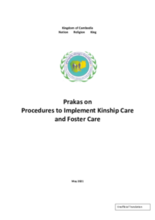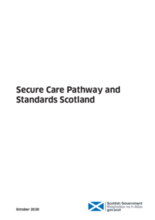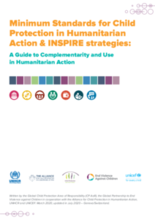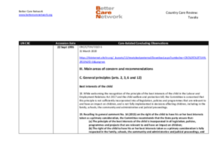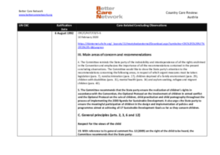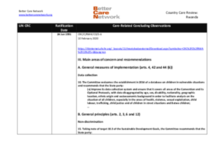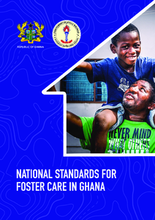Displaying 11 - 20 of 366
Ce document fournit des conseils sur la manière d'appliquer les normes internationales lorsque vous travaillez avec des enfants et leurs familles touchés par cette crise. La question à poser, systématiquement - quelle que soit la décision, l'action ou le processus - est "qu'est-ce qui est dans l'intérêt supérieur de l'enfant?" Cela s'applique à des situations sur le terrain qui sont complexes et ne permettent pas de réponses faciles.
This document provides guidance on how to apply international standards when working with children and their families impacted by this crisis. The question to be asked, consistently – whatever decision, action or process – is “what is in the best interests of the child?” This applies to situations on the ground that are complex and allow no easy answers.
This Prakas was drafted in accordance with Cambodia’s policies, standards and regulations to enable the implementation of kinship care and foster care. The Goal of the Prakas is to ensure the best interests of the child and protect the basic rights of the child separated from his/her biological parents and receiving kinship or foster care, so that they are safe and thriving in a warm, loving and happy family environment.
The pathway and standards set out what all children in or on the edges of secure care in Scotland should expect across the continuum of intensive supports and services.
The purpose of this Standard Operating Procedure (SOP) is to provide a standard and consistent approach to case conferencing as part of a comprehensive case management approach utilized during decision-making processes for children. The SOPs should be utilized by institutions (e.g. Charitable Children’s Institutions, or CCIs) and organizations as well as other actors engaged in decision-making around children’s care and protection.
The purpose of this note is to clarify the linkages and complementarity between INSPIRE seven strategies for ending violence against children and the 2019 Edition of the Minimum Standards for Child Protection in Humanitarian Action (‘2019 CPMS’); and to provide some practical guidance on how to use INSPIRE and the 2019 CPMS in conjunction for preventing and responding to violence against children in humanitarian settings.
This country care review includes the Concluding Observations of the Committee on the Rights of the Child.
This country care review includes the care related Concluding Observations adopted by the Committee on the Rights of Persons with Disabilities and the Committee on the Rights of the Child.
This Country Care Review includes the care-related concluding observations adopted by the Committee on the Rights of the Child and the Committee on the Rights of Persons with Disabilities, as well as other care-related concluding observations, ratification dates, and links to the Universal Periodic Review and Hague Intercountry Adoption Country Profile.
These Standards for Foster Care are available to all stakeholders engaged in the protection, care and support of children where foster care provision may be required. These Standards are intended to guide social workers and other service providers in monitoring foster care services.



